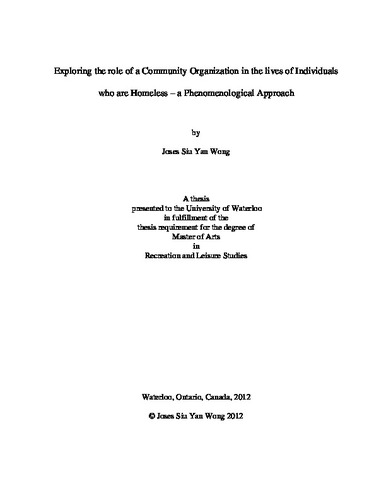| dc.description.abstract | The purpose of this phenomenological study was to explore the role of the Good Shepherd, a Catholic charitable organization, in the lives of those involved in it. Data collection methods consisted of semi-structured interviews and a limited amount of participant observation. A reflexive journal was also kept to help challenge and reflect on the assumptions I had as a researcher throughout the study.
Three major themes emerged from data analysis: (1) experiencing complex interactions within Good Shepherd, (2) fostering a culture of support, and (3) acknowledging that everyone has a different life story. The first theme described participants’ experiences in terms of associating with other individuals involved with the organization. The second theme demonstrates the different types of support that are felt by all associated with the Good Shepherd. The third theme illustrates how those involved in the Good Shepherd learn to appreciate each individual and to value everyone’s life story.
As a result of this phenomenological study, I challenged my original assumptions of those facing homelessness and developed a new understanding based on my experiences with all participants at the organization. Specifically, my beliefs changed in three ways. I learned that the problem of homelessness is a complicated phenomenon that involves more than the lack of a house, but a complex array of factors. I learned that those facing homelessness still value their dignity and constantly fight to maintain their sense of self-worth. And finally, I learned that those who are facing homelessness have not given up on life.
Four recommendations for future research emerged from this study: (1) studies comparing the perspectives of staff and clients associated with charitable organizations should be examined in order to identify the discrepancies between the two, (2) the benefits of leisure stress coping should continue to be tested to see its effects on those who are faced with homelessness, (3) studies comparing the differences between leisure usage and leisure opportunities for those facing homelessness should be addressed, and finally, (4) the specific benefits of having a sense of belonging to a community for those who are homeless should be identified. | en |

